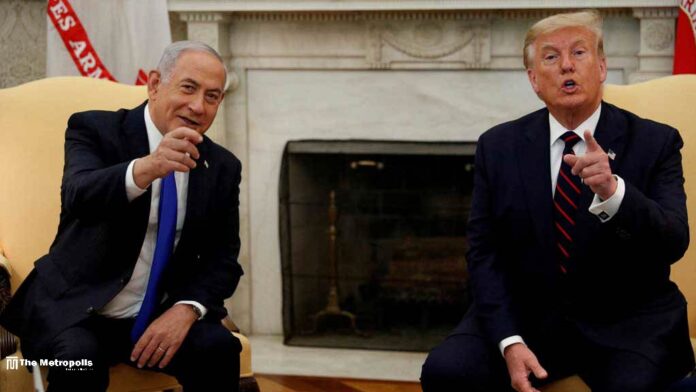When Israeli Prime Minister Benjamin Netanyahu meets U.S. President Donald Trump on Tuesday, he aims to reset relations after previous tensions with the Biden administration. Their discussions will focus on the Gaza ceasefire’s future and strategies to counter Iran.
Netanyahu, the first foreign leader hosted by Trump since his inauguration on January 20, may also face pressure from the strongly pro-Israel president, whose Middle East policies might not always align with Netanyahu’s priorities.
Their meeting coincides with the resumption of indirect negotiations between Israel and Hamas regarding the second phase of the ceasefire and the release of hostages. A joint press conference is scheduled following their discussions.
Speaking to reporters on Sunday, Trump stated that talks with Israel and other Middle Eastern nations were “progressing,” though he provided no specifics. The region remains at a critical juncture, with the Gaza ceasefire fragile, a tenuous truce between Israel and Hezbollah in Lebanon nearing expiration, and ongoing concerns about Iran’s nuclear ambitions despite its weakened state.
During his first term, Trump delivered several diplomatic victories for Netanyahu, including relocating the U.S. embassy to Jerusalem from Tel Aviv and brokering the Abraham Accords, which normalized relations between Israel and several Arab states.
Trump continues to express unwavering support for Israel, taking credit for helping broker the ceasefire between Israel and Hamas even before assuming office again. He has also emphasized his commitment to ending conflicts in the Middle East.
A major topic of interest is Trump’s ambition to renew efforts for a historic normalization deal between Israel and Saudi Arabia. However, how much flexibility Trump will grant Netanyahu remains uncertain. The Israeli prime minister faces pressure from far-right coalition members threatening to dissolve his government unless military operations in Gaza resume to dismantle Iran-backed Hamas. Continuing hostilities could hinder Trump’s efforts to bring Saudi Arabia into negotiations.
Nonetheless, Netanyahu is likely to receive a warmer welcome from Trump than he did from former President Joe Biden. While Biden maintained U.S. military support for Israel following Hamas’ October 7, 2023, attack, tensions arose over the high Palestinian civilian death toll and Netanyahu’s resistance to some U.S. requests.
‘No Assurances’
Trump’s Middle East envoy, Steve Witkoff, played a crucial role in securing the initial Gaza ceasefire deal under the Biden administration before the January 20 power transition. He is expected to remain heavily involved in further negotiations. The first phase of the deal saw Hamas release 18 hostages in exchange for Israel freeing hundreds of Palestinian detainees.
On Monday, Trump acknowledged to reporters that there were no guarantees the ceasefire would hold. Witkoff, however, expressed optimism, saying, “We’re certainly hopeful.”
Both Trump and Netanyahu have stated their intent to involve Saudi Arabia in regional agreements expanding on the Abraham Accords, aiming to strengthen a coalition against Iran.
However, Netanyahu’s firm rejection of Palestinian statehood—an increasingly popular stance in Israel post-Gaza war—could pose an obstacle to a deal with Saudi Arabia, which has historically demanded at least a pathway to Palestinian independence as a condition for normalization.
Since taking office, Trump has drawn controversy for suggesting that Palestinians in Gaza should be relocated to neighbouring countries like Egypt and Jordan, a stance aligned with Israel’s far right. This contradicts Biden’s commitment to preventing mass displacement, and Arab nations, including Egypt and Jordan, have firmly rejected the proposal.
For Netanyahu, whose international standing has been further complicated by the International Criminal Court’s (ICC) issuance of an arrest warrant over alleged war crimes in Gaza, the visit provides an opportunity to reinforce his diplomatic presence in Washington. The U.S. has firmly opposed the ICC’s actions.
Meanwhile, pro-Palestinian activists and groups advocating for the release of hostages held by Hamas are planning separate protests in Washington during Netanyahu’s visit.
Netanyahu will also meet with senior Trump officials and congressional leaders, likely seeking assurances on continued U.S. arms shipments. Within days of assuming office, Trump authorized the transfer of 2,000-pound bombs to Israel, a shipment previously blocked by the Biden administration.
Before departing Israel, Netanyahu told reporters that his discussions with Trump could help reshape the Middle East. The Gaza war has already altered regional dynamics, and experts suggest more shifts may be on the horizon.
A key topic will be Iran, which last year launched a massive missile and drone attack on Israel, prompting an Israeli counterstrike that reportedly weakened Tehran’s air defences.
Trump, who withdrew from the international nuclear deal with Iran in 2018, and Netanyahu have both pledged to prevent Iran from developing nuclear weapons. Concerns persist in Iran that Trump’s return to power could embolden Netanyahu to carry out strikes on its nuclear sites.



